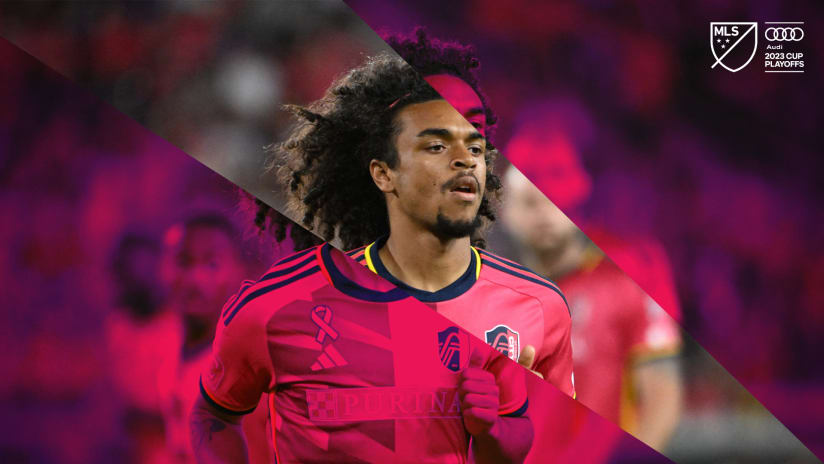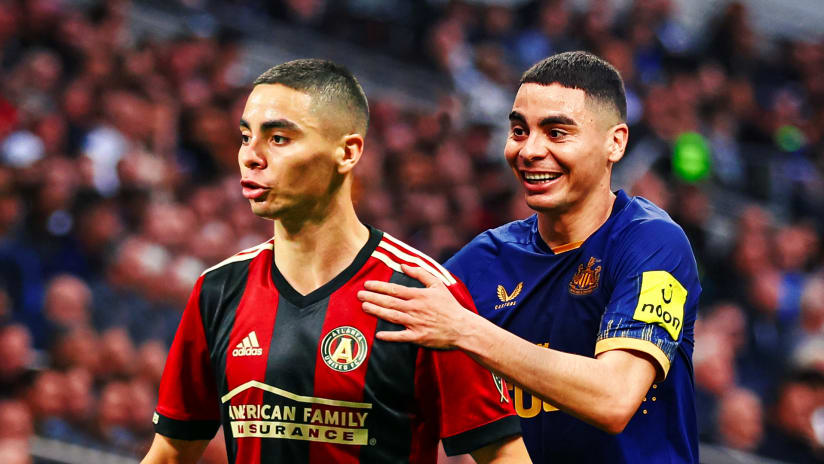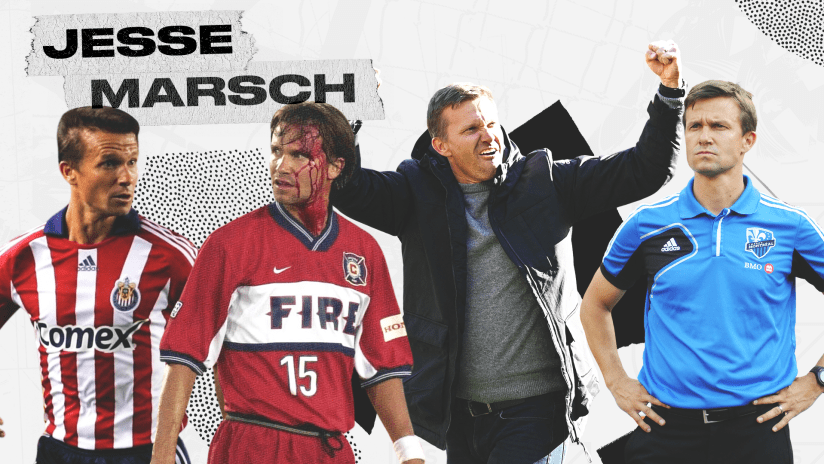IT TAKES A CERTAIN KIND of man to grab the mic and plead with your president and countrymen to end a civil war on live television.
So it was that, after Ivory Coast qualified for the 2006 FIFA World Cup in Oct. 2005, in the midst of a civil war that had been splintering the country for three years, Didier Drogba gathered his teammates tight around him, locked eyes with the camera and began to speak.
“Today, we beg you. We go down, on our knees. Forgive. Forgive. Forgive,” Drogba implored his country's feuding leaders. “Lay down your arms. Call elections. Everything will be better.”
Then, his face stretching into a characteristic smile, he broke into song: “We want to have fun, stop it with your guns.”
“It’s as if Ivorian hearts had been on fire,” remembers Kanate Dahouda, an Ivorian French and Francophone Studies professor at Hobart and William Smith Colleges. “The national team reconciles hearts. It was as if [Drogba] had brought solace to Ivorian hearts. For a few weeks, Ivorians chose to disarm their hearts and get involved in the peace process.”
It wasn’t the first time the Abidjan-born striker had lobbied for disarmament and peace; he’d done so as early as 2002, at the age of 24. And 2005 wouldn’t be the last time either, as the tenuous, temporary truce Drobga and his teammates helped inspire broke down and conflict resumed.
But although Ivory Coast’s future remained unclear – and would remain so as Drogba continued his reconciliation efforts with help from the United Nations through contentious elections in 2010 and more turmoil in the years to follow – it was obvious then, as it is now, that this was no ordinary man.
He was a leader. He was an icon. He was a legend.
More than a decade after he waded into the middle of a messy civil war, Drogba still transcends his sport, generating an almost cult-like following from Abidjan to Marseille to London to Istanbul and now Montreal.
This is his story.
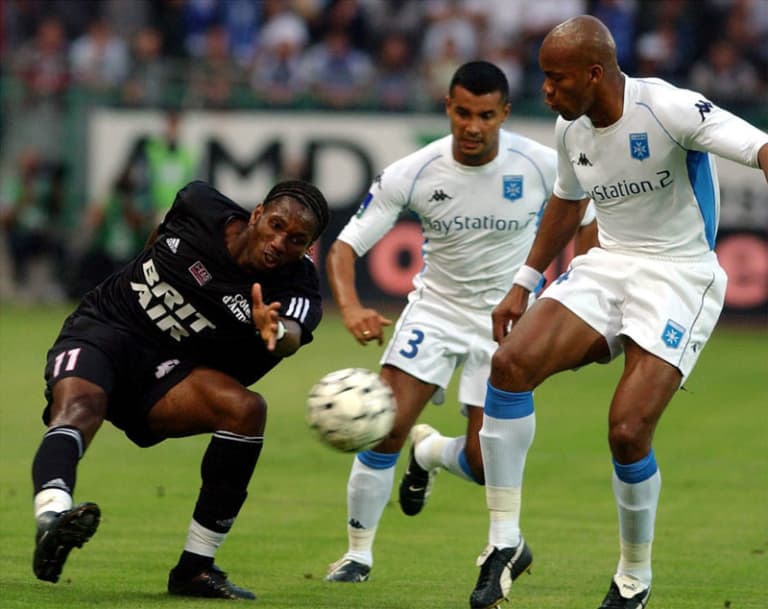
Drogba's second professional stop was Ligue 1 club Guingamp, where he announced himself to French soccer by scoring 17 goals in his first season in the first division. His performances earned the club a seventh-place finish, and the Ivorian was rewarded with a multi-million dollar transfer to Olympique de Marseille. Photo via Reuters
BORN ON MARCH 11, 1978, in Abidjan, Ivory Coast’s economic center on the Gulf of Guinea, Didier, the eldest of Albert and Clotilde Drogba’s six children, half of whom would play professional soccer, was seemingly born to play the game.
It didn’t always seem like destiny, however, for the late bloomer.
After getting his first taste for the game at age 5 – when he left for France to join his uncle and Ligue 2 striker Michel Goba for three years – a teenage Drogba settled permanently in Europe with his family in 1991. He bounced between youth and amateur teams while attending school before finally signing his first pro deal with Ligue 2 club Le Mans.
Drogba made his debut in 1999 for Le Mans, where he remained until January 2002. He adjusted to life as a professional the hard way. Eric Horrenberger, a reporter at the Ouest-France newspaper based in Rennes, remembers a young player who, despite being “comfortable in his own skin and living a good life,” mostly came off the bench for the Ligue 2 club.
Despite scoring just 12 goals for Le Mans, “to everyone’s surprise,” Horrenberger recalls, Ligue 1 side Guingamp spent close to six-figures to bring in the yet unproven striker. When Drogba first trained with his new Guingamp teammates, head coach Guy Lacombe and assistant Eric Blahic exchanged a look. They had no idea he’d be that good.
He would not be – at first, at least – all that productive. Despite scoring three goals before the summer, Drogba spent the beginning of the 2002-03 season dealing with an injured foot before a break in the schedule gave the club’s training staff time to pinpoint his issues.
“He couldn’t kick the ball,” Horrenberger remembers, “so Stéphane Wiertelak, the fitness coach, remodeled his physique by running around the island. Didier on foot and Stéphane on a mountain bike. He came back stronger.”
Finally, as Drogba closed in on his 25th birthday, signs of a world-class talent began to emerge. He finished third in the Ligue 1 scoring chart that season, tallying 17 times in 34 games by combining with friend and future Chelsea teammate Florent Malouda. He also came out of his shell.
“He was simple, spontaneous, generous to this provincial crowd,” Horrenberger says. “It was simple, it was beautiful. And what a smile. He was a true leader.”
“He left wonderful memories of this blessed period,” Horrenberger continues. “He chanted, ‘Les Paysans sont de retour [The Countrymen are back],’ with the supporters. He brought charisma and always recalled how nice it had been at Guingamp. In the last game of the 2003-04 season, playing for Marseille and hosting [his already-relegated former team], he did his utmost not to put one of his shots on frame.”
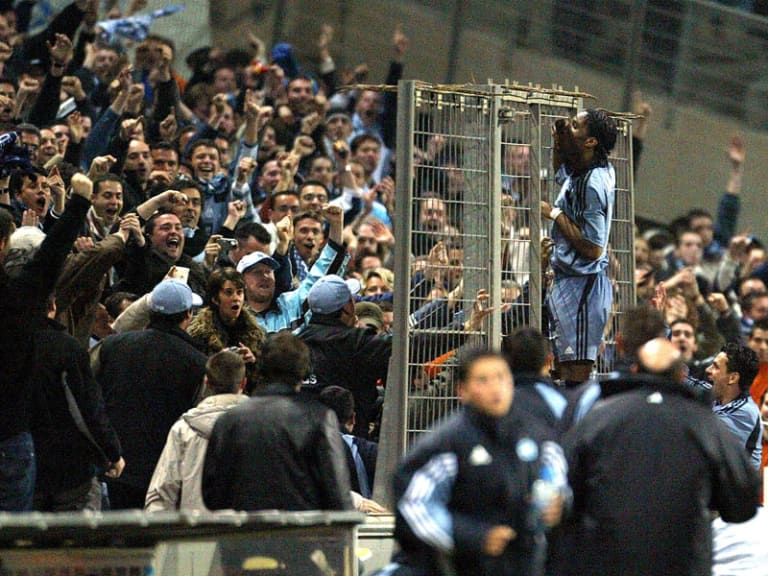
Though he was only in Marseille for one season, Drogba forged a special bond with the fans, who were so desperate for his return that they eventually raised a transfer fund themselves to encourage the club to bring him back. That connection is clear (above) as the striker celebrates a UEFA Cup goal against Inter Milan with the fans in the Stade Vélodrome.Photo via Reuters
INDEED, MARSEILLE IS WHERE DROGBA'S CAREER would take him next, for one momentous year. Although he would reach new heights, the pressure to perform was immediate, recalls Impact defender Hassoun Camara, formerly of l’OM.
“He didn’t arrive as this big star,” Camara says. “He’d done a fine season at Guingamp, but Marseille, every year, would expect a name, a world-class forward. He had to prove his worth straightaway. But what an incredible journey it was.”
Though he signed with Marseille two years after Drogba left, Camara witnessed the Ivorian's long-lasting impact. Drogba was still the talk of the town: his lone season yielded 30 goals in 51 games and Ligue 1 Player of the Year and Goal of the Year awards. The rest of Europe took notice, too. His six goals in eight games led Marseille to the UEFA Cup final, where they lost to Valencia.
“He made history, although he didn’t stay for a long time,” Camara says. “It was unbelievable for the supporters. I remember one game, we were warming up at the Vélodrome, and I could hear supporters chanting his name – he’d already left. You rarely see that, especially in France.”
In 2008, four years into Drogba’s Chelsea career, Marseille fans raised funds in the hopes of footing a transfer fee that might lure him back. Speaking to Le Monde in 2012, then-OM president Vincent Labrune gave a belated assessment of Drogba’s lone season in France’s second city.
“I’ve rarely seen a player carry a team on his shoulders like Drogba did,” Labrune said. “… Oh, yeah, there was Maradona at Napoli before him, in the 1980s.”
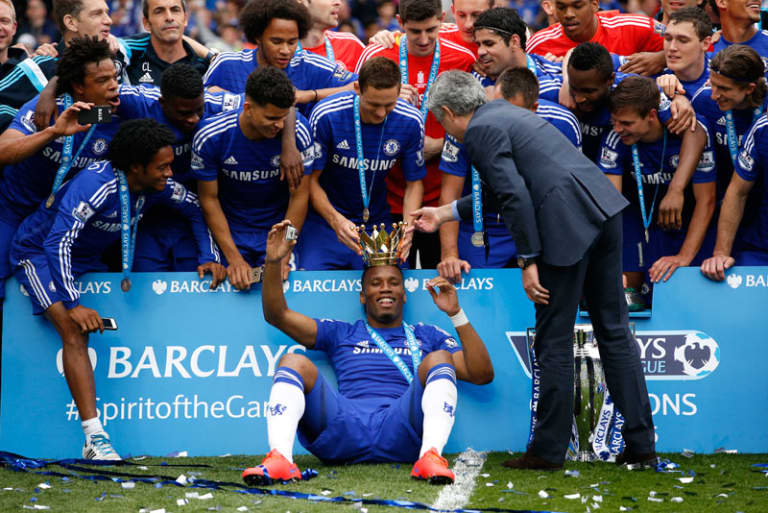
Arguably the most beloved Chelsea player in the history of the West London club, Drogba enjoyed two stints with the Blues, winning 14 trophies across all competitions. He's picture here during the celebrations following Chelsea's 2014/15 Barclays Premier League title celebrations. Photo via Reuters
DAVID JOHNSTONE, OWNER OF THE DROGBA LEGEND banner that now hangs at Stade Saputo and editor of a popular fanzine, remembers catching a flight and a glimpse of Drogba in Marseille, a day after watching Chelsea lose at Monaco in the first leg of the 2003-04 UEFA Champions League semifinals.
L’OM were due to play Newcastle United later that week, and their star striker was holding court in the terminal before the team flight.
“I saw Didier dressed in his club tracksuit surrounded by young fans and signing autographs and thought to myself, ‘He’s just the kind of player that Chelsea could do with,’” Johnstone remembers. “The next season, he had signed.”
Drogba scored his first Blues goal on Aug. 24, 2004, heading home a Celestine Babayaro cross – a goal that every Chelsea supporter in the ground will always remember, Johnstone says. Drogba quickly proved he was among the Premier League’s best, as Chelsea captured back-to-back Premier League titles.
But he didn’t truly capture Chelsea supporters’ hearts until 2006-07, according to Johnstone, when Drogba cemented his legacy by scoring two goals in a League Cup final victory and the winner in the FA Cup final, endearing himself to Blues supporters around the globe.
He’d finish with 164 goals for the club, a four-time BPL champion, four-time FA Cup winner, three-time League Cup winner and, perhaps most importantly, the man of the match in Chelsea’s UEFA Champions League final victory against Bayern Munich in 2012, what would be his last match for the club until a brief return in 2014-15.
Invited to the celebration party after that historic match in Munich, Johnstone settled in by the hotel pool, next to Drogba and Chelsea director Marina Granovskaia. When he asked Drogba if a new contract is in the works, the star striker looked at Granovskaia and simply said: “Ask Marina.”
Drogba would leave the club that summer, though not before pushing head coach Roberto Di Matteo into the pool during the celebration – only for Di Matteo to pull the Ivorian, later named Chelsea’s greatest ever player in a poll, in with him, both fully clothed.
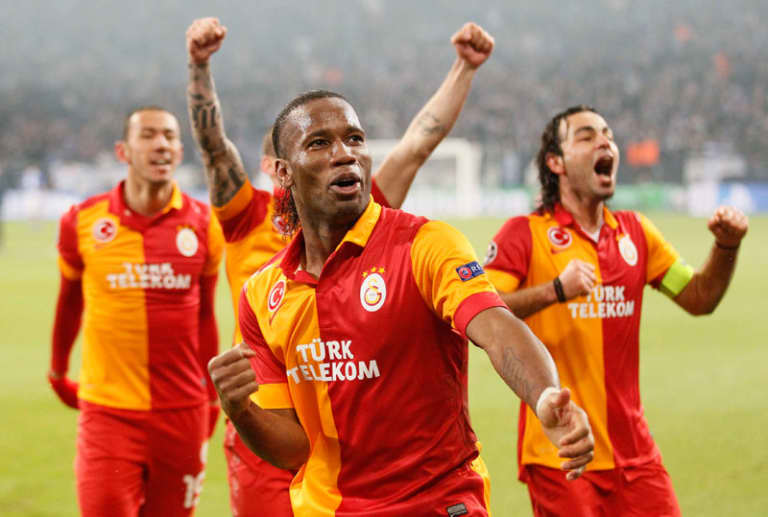
After a move to China went sour, Drogba made his way to the Turkish capital, where Galatasaray fans welcomed him with open arms – and plenty of flares. And that was just at the airport. With the legendary striker on board, Gala made a run to the UEFA Champions League quarterfinals, cementing his place in club lore. Photo via Reuters
AFTER AN ILL-FATED, EIGHT-MONTH STAY at Shanghai Shenhua that included eight goals in 11 games and reportedly a disagreement over unpaid wages, Drogba moved to Turkey, where his reputation preceded him. Galatasaray surprised their supporters with a move for the Chelsea legend in January 2013, and the mad scenes that welcomed Drogba at the Istanbul airport came as a shock to the rest of the world.
“From what I can recall, no player has ever gotten such a spectacular welcome at Galatasaray,” says Ali Kizarmis, a Montreal Impact fan of Turkish origins who also supports Galatasaray. “The supporters reached a new level with that welcome. Shivers went down my spine.”
Coupled with the signing of Wesley Sneijder a week earlier, the move for Drogba convinced Gala supporters that their club was eager to put its imprint on the UEFA Champions League.
Indeed, Gala defeated Germany’s Schalke 04 in the Round of 16, reaching the quarters for the first time in 12 years. Although their team lost 5-3 on aggregate to Real Madrid, the 3-2 second-leg home win was a sign of intent and Gala coasted to a second straight league title.
“Drogba was a bit of a savior,” Kizarmis remembers. “When he arrived, the team’s mentality changed. At first, players were hopeful, but not that much. But when Didier was introduced, social media and the major Turkish media exploded. It boosted the team. On the field, players committed more – even in training, players would smile more. We could see a chemistry develop quicker.”
Kizarmis credits Drogba with enhancing the club’s reputation on the world stage, as well as its value – literally. Shares of Galatasaray, a publicly traded company, could be bought for 39.40 Turkish lira before Drogba signed. Two weeks after he arrived, the stock reached 44.40 lira, a highpoint it hasn’t reached since. Shares opened at 21.78 lira on Wednesday.
Once again, Drogba’s personality took over as he showed off his exuberant style on the in-house TV station, GSTV.
“Without hesitation, he would grab the mic, go around a room, interview players, be playful,” Kizarmis says. “Cameras in the locker room, in the treatment room, they were never an issue for him.”
It hasn’t always been that way in Montreal, but Kizarmis has a theory.
“Maybe Didier’s had enough of being the savior,” Kizarmis says. “At Chelsea, he did his part. At Galatasaray, he did his part. Here, in Montreal, he’s got this reputation as a savior again. At some point, it’s got to weigh on you.”
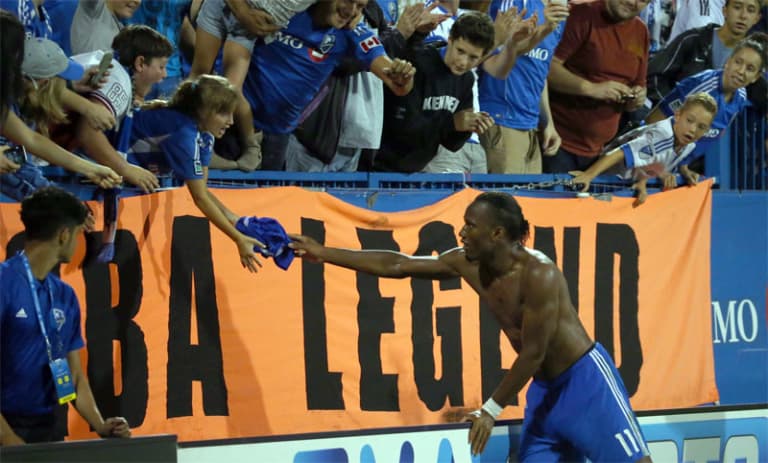
Arriving with the requisite fanfare during the summer of 2015, Drogba wasted no time setting MLS on fire. He scored 12 goals in 14 games and nearly led the Impact to MLS Cup, foiled by Columbus Crew SC in the Eastern Conference semifinals. Photo via USA Today Sports Images
TWELVE GOALS AND ONE ASSIST IN 14 GAMES, a jump from 7th to 3rd in the East, and an Eastern Conference semifinal. Some might say Drogba's savior reputation seems justified.
It certainly felt that way on July 29, 2015, when a frenzied mob including large contingents of his countrymen welcomed Drogba to Quebec at Montréal–Pierre Elliott Trudeau International Airport. It was pandemonium reminiscent of Istanbul.
In Montreal, it is dubbed the “Drogba Effect,” and it’s felt on the field, at the ticket office, in the stands, in the media, in the locker room – even in the Impact’s youth system. Remember that dance video?
Last season’s heroics and some will-he, won’t-he contract drama in the summer raised expectations for 2016 – as if they weren’t high enough – but as his Montreal homecoming looms, this Saturday at Stade Saputo against Toronto FC (4 pm ET, RDS/TSN4 and MLS Live), Drogba seems unphased, pushing the spotlight on to the group.
“I hope I do better than last season, but my objective is not becoming [MLS] top scorer,” Drogba told reporters on Wednesday morning. “The objective, for me, is winning a championship, or at least finishing on top of our conference and going as far as possible. I’ve won plenty of individual awards. But team awards taste so much better.”
Considering the bigger picture. Bringing people together. Leadership in the man’s blood. It just so happens that people – from Montreal to Istanbul to London to Marseille to Abidjan – can’t help but follow.
“He remains the only national hero in Ivory Coast – and I am weighing my words,” Dahouda says. “He emerged during a serious crisis when we needed a national, unifying hero.
“Only two factors would unite Ivorians then,” the professor adds. “Music and football.”
And, of course, Didier Drogba.
THE WORD is MLSsoccer.com's regular long-form series focusing on the biggest topics and most intriguing personalities in North American soccer.


